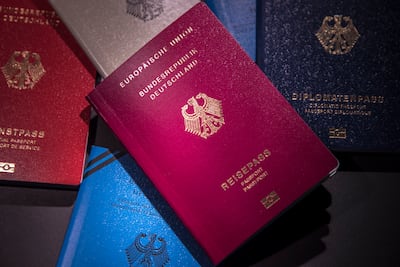Live updates: Follow the latest news on Israel-Gaza
Germany will question migrants on the founding of Israel, the history of Jewish life and the consequences of Holocaust denial as part of an updated citizenship test.
New multiple-choice questions have been drafted to make migrants familiar with Germany’s stance on anti-Semitism and what it sees as its “special responsibility” with Israel given the crimes of the Nazi regime.
Amid unrest over the war in Gaza, the Interior Minister Nancy Faeser has ordered that the topics of anti-Semitism, Jewish life and Israel’s right to exist should have "greater weight” in the questionnaire, which is part of the route to a German passport, a spokesman told The National.
The questions, which have been leaked to German media, do not probe people’s political views, only their knowledge.
An applicant with anti-Semitic views would still pass the test if they ticked the correct answers, though they might fail on a separate requirement to abide by German values.
While the new citizenship law does not require explicit support for Israel’s right to exist, some fear criticism of Israel will be equated with anti-Semitism.

What are the questions?
1. When did the first Jewish community exist in what is now Germany?
a) about 300 years ago b) about 700 years ago c) about 1,150 years ago d) about 1,700 years ago
Answer: d) about 1,700 years ago. A Roman letter from AD 321 mentions Jewish people living in Cologne
2. Who can become a member of the roughly 40 Jewish "Maccabi" sports clubs in Germany?
a) only Germans b) only Israelis c) only religious people d) anyone
Answer: d) anyone
3. Which cities have the biggest Jewish communities in Germany?
a) Berlin and Munich b) Hamburg and Essen c) Nuremberg and Stuttgart d) Worms and Speyer
Answer: a) Berlin and Munich
4. What is the name of the Jewish house of worship?
a) Basilica b) Mosque c) Synagogue d) Church
Answer: c) Synagogue
5. On what legal basis was the state of Israel founded?
a) a UN resolution b) a resolution by the Zionist Congress c) a proposal by the German government d) a proposal by the Soviet Union
Answer: a) a UN resolution, in 1947, calling for the partition of the former British-controlled mandate into Jewish and Arab states
6. Where does Germany’s special responsibility for Israel come from?
a) Membership in the European Union b) Crimes committed by the Nazis c) The German constitution d) Christian tradition
Answer: b) Crimes committed by the Nazis, who murdered six million Jews during the Holocaust

7. What is an example of anti-Semitic behaviour?
a) Attending a Jewish festival b) Criticising the Israeli government c) Denying the Holocaust d) Playing football against Jews
Answer: c) Denying the Holocaust
8. What do the so-called "stumbling stones" in German cities commemorate?
a) Famous German politicians b) The victims of National Socialism c) Traffic deaths d) Well-known Jewish musicians
Answer: b) The victims of National Socialism. The small plaques on German pavements typically bear the names of local people killed in the Holocaust
9. How can someone who denies the Holocaust be penalised?
a) Benefit cuts b) Up to 100 hours of community service c) Not at all, Holocaust denial is legal d) Up to five years in prison or a fine
Answer: d) Up to five years in prison or a fine
10. What behaviour with regard to the state of Israel is banned in Germany?
a) Publicly criticising Israel’s policies b) Hanging an Israeli flag on private property c) Discussing Israel’s policies d) Publicly calling for Israel’s extermination
Answer: d) Publicly calling for Israel’s extermination
The new test was first revealed by the newspaper Die Welt and magazine Der Spiegel. An Interior Ministry spokesman declined to comment on the specific questions.

How does the test work?
Each test has 33 questions.
They are chosen from a catalogue of 310 possible questions, meaning not all of those on Israel and anti-Semitism would come up.
Answering 17 correctly is enough to pass. The test lasts an hour.
What else is required to become a German citizen?
A new citizenship law cuts the waiting period from eight years living in Germany to five.
It offers a three-year route for those who integrate especially well.
As well as passing the test, people must show they speak reasonable German and can support themselves financially.
They must pass a criminal record check and swear allegiance to Germany’s basic democratic values.
Israeli and Palestinian demonstrations across Europe – in pictures
Do you have to support Israel?
The idea of asking for an “explicit affirmation” of Israel’s right to exist was rejected from the recent bill.
However, a clause was added to say that racist or anti-Semitic behaviour is incompatible with German values.
Some experts worry this is too vague and could be used against pro-Palestinian activists.
It deals with “behaviour that is not criminal, that doesn’t meet the threshold of criminal law ... where it begins, that’s going to be a tough issue to sort out”, citizenship law expert Tarik Tabbara told The National after the bill’s passage.
Who is affected?
The revamped test applies to people aged 16 and over seeking German citizenship.
People from the Middle East, especially Syrians, make up a huge chunk of current applicants.
There is an exemption for Germany’s heavily Turkish "guest worker" generation, who do not have to take the test.
People from Turkey are also expected to benefit from relaxed dual citizenship rules meaning they can keep both passports.

























